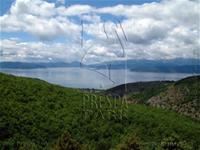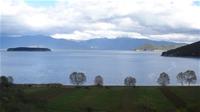Ecology could be a uniting force in the Balkans
Evelyna Topalova, January 10, 2011
 Is there any force that could make Greece, Macedonia and Albania put aside their disagreements and confrontations? The answer is yes - the ecology. Macedonian media reported that the European Commission had green-lighted these days the trilateral common project for protection of the Prespa Lakes. In November 2009 the prime ministers of the three countries, George Papandreou (Greece), Nikola Gruevsky (Macedonia) and Sali Berisha (Albania), agreed to cooperate in protection and sustainable development of the park. They vowed to work together for preservation of the biological diversity and the ecosystem, as well as to reduce water and soil pollution.
Is there any force that could make Greece, Macedonia and Albania put aside their disagreements and confrontations? The answer is yes - the ecology. Macedonian media reported that the European Commission had green-lighted these days the trilateral common project for protection of the Prespa Lakes. In November 2009 the prime ministers of the three countries, George Papandreou (Greece), Nikola Gruevsky (Macedonia) and Sali Berisha (Albania), agreed to cooperate in protection and sustainable development of the park. They vowed to work together for preservation of the biological diversity and the ecosystem, as well as to reduce water and soil pollution.
On February 10th 2010, on the 10th anniversary of the declaration of the zone, the three countries signed an agreement on the protection and sustainable development of the Prespa Park Area. The EU is the fourth side of the deal. Now, a year later, the agreement awaits approval by the European Parliament.
Macedonian Minister of Environment Nexhati Jakupi commented that the trilateral agreement is a successful example of international cooperation that would encourage investments in the area. Macedonian TV Sitel reports that the Greeks have already started thinking how to attract more tourists in their part of the reserve by promoting the unique flora and fauna, and even a fishermen village. In the Macedonian part, however, problems with the sanitation still persist, the media says and adds that Minister Jakupi has promised that a new sewage facility will be launched soon. He announced also investments in the infrastructure and tourism sector.
The Prespa Park is the first first trans-border protected area in the Balkans  established in February 2000. The park includes a system of two lakes and their surroundings. It is a home of more than 260 species of birds, 1,500 species of plants, 60 mammal species. Some of the species populating the park are endangered and protected by a series of national and European conventions. Others are unique and could be seen only here.
established in February 2000. The park includes a system of two lakes and their surroundings. It is a home of more than 260 species of birds, 1,500 species of plants, 60 mammal species. Some of the species populating the park are endangered and protected by a series of national and European conventions. Others are unique and could be seen only here.
The project for protection of the biodiversity in the Prespa area is an example how three countries - an EU member state, an EU candidate and the third - a country still waiting for an EU candidate status - could turn their back to bilateral problems and think about the future - think about the nature next generations will inherit.